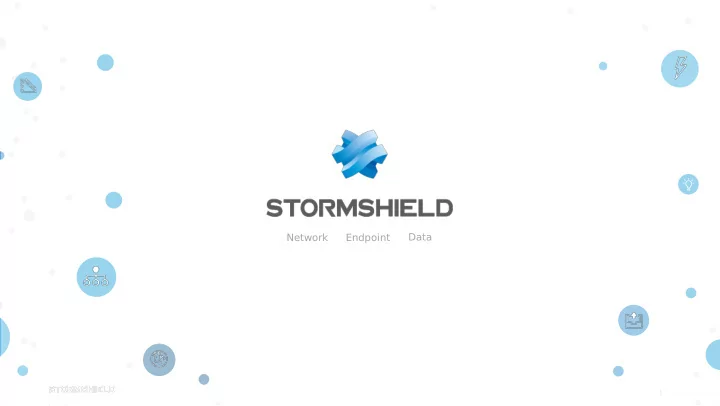

Network Endpoint Data 1
TLS 1.3 : Solving new challenges for next-generation firewalls (NGFW) Pass The Salt 2019 2
Who are we ? Nicolas Pamart Damien Deville Thomas Malherbe ● Apprentice Developer T echnical Leader Developer Does stuff, Does stuff Does stuff Did not have a choice to talk In front of you damien.deville@stormshield.eu thomas.malherbe@stormshield.eu nicolas.pamart@stormshield.eu www.stormshield.com 3
We’re on the network ... 4
We protect users & enforce company policy 5
With our state of the art IPS 6
Focus on TLS application filtering 7
TLS : T ransport layer security A TLS connection TLS in the network stack 8
TLS 1.2 – Analysed Handshake TLS 1.2 - Handshake [ ] = Encrypted 9
With these data 10
But now … TLS 1.3 encrypts server certificate 11
Brand new TLS 1.3 handshake [ ] = Encrypted TLS 1.2 TLS 1.3* *RFC8446 12
We are passive*, we do not decrypt *On the TLS layer 13
Server certificate is a public information 14
About certificates 15
How-to: Get the same certificate ● Send the same server name indication (SNI) ● Propose the same cipherlist ● Send our own KeyShare extension 16
Wait, usually kernels don’t speak TLS ! 17
Dear userspace daemon, talk for me 18
Yay ! We saved our feature 19
But for each connection ?! 20
21
Let’s cache certificate ! Pros ● 0 delay certificate retrieval ● Less load on server ● Less load on NGFW Cons ● Design the cache : tune entry expiration date & cache size ● Design the cache #2 : do something that works 22
Let’s cache it ! 23
Let’s cache it ! 24
How do we identify cache entries ? 25
Handling session resumption 26
TLS 1.3 session resumption 27
TLS 1.3 session resumption : limitations ● Not really impacting our solution We base ourselves on ClientHello information => SNI is « theorically* » provided in resumption ClientHello ● Some malicious peers could not provide SNI during resumption, thus breaking our filtering *RFC 8446 section 4.2.11 : Pre-Shared Key Extension 28
Simple, just check the presence of SNI no ? 29
The problem with SNI ● SNI is not mandatory ... ● Need to check if original session was initiated with SNI ● How to do that ? 30
Another cache … for the SNI ! 31
The big picture 32
SNI not coherent 33
SNI coherent & Cache HIT - PASS 34
SNI coherent & Cache HIT - BLOCK 35
SNI coherent & Cache MISS - PASS 36
Proof of concept 37
PoC : design 38
PoC : supported features ● SNI coherence cache ● Certificate Caching ● Application blacklisting => Statistics gathering 39
PoC : results for 1 day / 1 user Cache misses: 259 SNI incoherences : 0 Total: 2509 => Ratio: 10.32% cache miss 40
Final note 41
World is safer now ● Facebook is blocked again ● That’s how we saved the world 42
20+ Open jobs! Villeneuve d’Ascq – Paris (ILM) - Lyon www.stormshield.com/join-us/ 43
Thank you Looking forward to hearing from you Get in T ouch 22, rue du Gouverneur Général Éboué +33 (0) 9 69 32 96 29 nicolas.pamart@stormshield.eu 92130 Issy-les-Moulineaux FRANCE damien.deville@stormshield.eu thomas.malherbe@stormshield.eu 44
About encrypted SNI (eSNI) ● Currently as a draft ● Can break our solution as we are not able do obtain the SNI ● Encrypted via key given in DNS => Solution : We also analyze DNS trafic (If you use DNSsec on top of that you may beat us) 45
TLS in kernel ● Requires to have the whole chain of cert in kernel => Not enough memory to do that, too costly ● It is technically possible to do TLS in kernel 46
About PSK-only servers (if it exists) ● PSK can be used to authenticate server => Thus no need for server certificate => Our solution don’t work (or don’t apply) ● Solution : Whitelist PSK-only servers 47
TLS 1.3 early-data ● Stripped when mimicking ClientHello ● Concerns about anti-replay ● We can’t provide sufficient security for anti-replay 48
TLS 1.2 handshake [ ] = Encrypted 49
TLS 1.3 handshake [ ] = Encrypted 50
TLS 1.3 session resumption 51
TLS 1.3 0-RT == Resumption + Early data 52
Recommend
More recommend